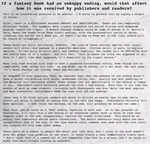Questioner
I'm very interested about the laws of magic. You wrote so many books, but I think that history will specially remember you because of 2.5 words, right? "Limitations are a bigger sign than powers," right? So, limitations must be bigger than powers, and I think it's a wonderful, amazing second law of magic, and it actually should be applied to the fantasy genre as a whole, because therefore we could avoid 90% of all the garbage that is out there if we really applied this second law of magic. However, you don't apply it to all your works. For example, your work for young adults, you don't apply that law that much, so I'm wondering why it is not a universal law, but rather a law that in some things, like for children or young adults, you don't apply so much?
Brandon Sanderson
That is interesting. I actually take exception to several things here. The first is, I don't believe that 90% of things are crap, or that there is a lot of terrible fiction. I take exception to when people say that about our genre or about any genre. Books that get published and are written are loved by somebody. Maybe that's just the author and the editor--once in a while--but usually there is a strong fanbase, and just because one person doesn't like it doesn't mean it lacks value.
Questioner
Sturgeon's Law?
Brandon Sanderson
I don't believe in Sturgeon's Law.
Questioner
No?
Brandon Sanderson
I think it's complete bunk.
Questioner
Okay?
Brandon Sanderson
In fact, Sturgeon did not believe in Sturgeon's Law, if you asked him. He did not believe in it, I do not believe in it. I think by perpetuating Sturgeon's Law, which is that 90% of everything is crap, what we are doing is we are buying into people outside of science fiction and fantasy pointing at us and trying to make us feel bad about our genre. This is not to say that you can't criticize, you definitely can, and there is a very important place for critics, looking at books and at the genre. But once, I thought about Sturgeon's Law, and I actually tried to decide if critics actually hated 90% of everything. And so I went to Rotten Tomatoes, and I picked the harshest critics I could find, and every one of them liked seven out of ten of these movies they saw.
So, while I think certain things can be pointed at, and say, "This is poorly done, because it is failing to achieve it's goals," we should not look at something that's achieving a different goal from what we think it should achieve, and call it crap because of that. If you can see, this is a point of a bit of interest to me. If someone points at, for instance, a lot of people in the genre disliked Eragon the book, I've referenced the movie earlier. But, is it bad for the millions of children who read that, and it brought them to fantasy and became the foundation for why they love our genre?
Questioner
Compared with the movie, it's not bad, right?
Brandon Sanderson
*laughs* Yeah. So, going back to your original question, though, my primary YA work is The Rithmatist, which is a story about a boy with no magic at a magic school, and is inherently a story about having no power, and having limitations. If you are referencing, instead, Alcatraz, my other series, it's about a boy whose magic power is breaking things, and he has no control over it. So, this is a story about a child who is in foster care, who has no control over his life, and his lack of control of his magic is a metaphor for his lack of control over his life. But Sanderson's Second Law is about finding the conflict. Making characters powerful can be a problem, but it doesn't have to be. For instance, Superman is usually held up as a character who is considered too powerful. But if you look at the best stories involving Superman, the story is always about what he can't do. He can fly, he can shoot lasers from his eyes, he can lift giant boulders, but he can't make a woman love him. This is what I mean by limitations being more important than the powers. A Superman story can be very interesting, but his powers can often be irrelevant.


